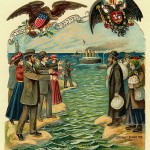Aaron Denlinger reminds that until the Reformation, the western church located infallibility in Scripture alone:
In responding to Rome’s teaching, Calvin — interestingly — doesn’t bother defending the authority of Scripture from Scripture. Presumably that’s because he realizes that Protestants and Roman Catholics actually agree that Scripture constitutes the “Word of God” rather than the “word of man” (1 Thess. 2.13), and is therefore inspired and authoritative (cf. 2 Tim. 3.16). The Roman decree cited above, after all, acknowledges that “saving truth” is contained in the “written books” of Scripture, which books are thus deserving of our affection and reverence. Protestantism, of course, stops there. Rome carries on, and makes a positive claim about another source of “saving truth” — namely, “unwritten traditions … which have come down even to us, transmitted as it were from hand to hand.”
The burden of proof that something other than Scripture constitutes a source of “saving truth” — whether that something be “unwritten traditions” or Chinese fortune cookies — rests entirely with those making such claims. This is often overlooked by would-be Roman apologists who require Protestants to defend from Scripture their principle that Scripture alone is authoritative, and fail to realize that sola Scriptura is not a positive claim per se, but a denial of the positive claim that “unwritten traditions” or anything else deserve the moniker “Word of God.”
Calvin could, then, have simply highlighted the failure of Rome to prove that “unwritten traditions” constitute a source of “saving truth” and called it a day. But he does one better. Drawing upon his extensive knowledge of the Church Fathers, he points out that the earliest Christian thinkers themselves recognized no infallible authority but Scripture. In other words, he argues from tradition against the view that tradition constitutes an authoritative word on par with Scripture: “In regard to Traditions,” he writes, “I am aware that [frequent] mention of them is made by ancient writers, though not with the intention of carrying our faith beyond the Scriptures, to which they always confine it.”
The issue between Protestants and Rome is not simply Scripture versus Scripture plus tradition. It is instead whether a source of truth is infallible:
J.N.D. Kelly notes that up until the fourth century, the Fathers were univocal in affirming Scripture as the exclusive source of Christian doctrine. The words of Cyril of Jerusalem in the fourth century might be taken as representative: “With regard to the divine and saving mysteries of faith, no doctrine, however trivial, may be taught without the backing of the divine Scriptures.” Athanasius put it this way: “The holy and inspired Scriptures are fully sufficient for the proclamation of the truth.”
When the Fathers did speak of tradition (as Calvin acknowledges they did), they typically understood it not as a source of unique Christian doctrine, but as the Church’s universal interpretation of Scripture’s most fundamental teachings, handed down from one generation of believers to the next. To put it another way, traditional teachings were considered necessary to be believed not because they were traditional, but because they were Scripture’s teachings. It wasn’t until the late fourth century, in fact, that Christian thinkers began to toy with the possibility that certain truths or (more commonly, at least early on) customs could be traced back to the Apostles even if they weren’t reflected in Scripture. In the medieval period the notion of extra-scriptural apostolic truths became more common (though many medieval thinkers retained the earlier, Patristic perspective of Scripture as the solitary source of saving truth, and tradition as the means by which Scripture’s truth is transmitted through the centuries).
When Trent, then, affirmed that “saving truth” is contained in both Scripture and “unwritten traditions,” it canonized a view on the source(s) of Christian doctrine which was an aberration from the understanding of the earliest Christians.
Sure, sola Scriptura plays to Protestants advantage since it denies arguably the most significant piece of the Roman Catholic magisterium’s authority. But the affirmation of tradition by Trent is no less self-serving.
(Image: Un Violon sur le Toit)












